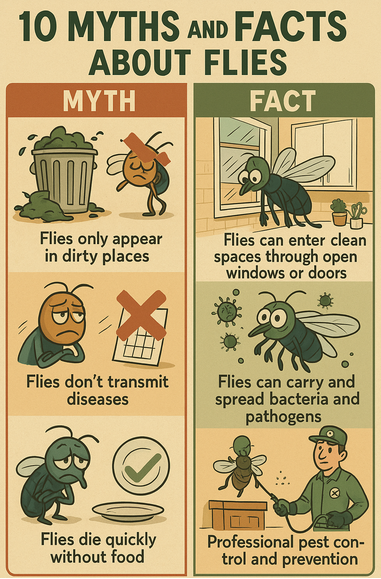
Flies are common insects worldwide, and although everyone has seen them, we don’t always know how they live, feed, or transmit diseases. There are many popular beliefs that can lead to mistakes in their prevention and control.
At Eco Fauna Control, experts in professional pest management in tropical climates like Aruba, we help you separate facts from fiction so you can better protect your home or business.
1. Flies only appear in dirty places — ❌ Myth
While dirt attracts them, flies can enter clean spaces looking for food, moisture, or shelter. Even in spotless kitchens, an open window can be enough for them to get in.
2. Flies only live for a few days — ❌ Myth
Their lifespan depends on the species and environmental conditions. The average housefly can live between 15 and 30 days—enough time to reproduce several times.
3. Flies don’t bite — ✅ Fact
Houseflies don’t bite; they feed on liquids. However, other species, such as stable flies or tsetse flies, do have mouthparts designed to suck blood.
4. Flies carry diseases — ✅ Fact
Flies can transport bacteria, viruses, and parasites on their bodies and legs, contaminating food and surfaces. This increases the risk of illnesses such as salmonellosis or dysentery.
5. Flies only reproduce in garbage — ❌ Myth
They can reproduce in food scraps, manure, decomposing organic matter, compost, and even in puddles containing organic waste.
6. Flies help nature — ✅ Fact
Although they can be a nuisance, some species play an ecological role by aiding in the decomposition of organic matter and serving as food for other animals.
7. Electric traps eliminate all flies — ❌ Myth
They are effective but won’t completely solve the problem. The ideal control combines traps with hygiene measures, physical exclusion, and, when necessary, professional treatments.
8. Flies only fly during the day — ❌ Myth
Many species are more active during the day, but some, such as certain fruit flies or drain flies, can be active at night.
9. If there’s no exposed food, they won’t come in — ❌ Myth
Flies may enter seeking shelter, moisture, or even to lay eggs, even if no visible food is present.
10. Professional control is the most effective solution — ✅ Fact
Homemade measures help, but when there’s a high population or a health risk, professional service ensures a safe, fast, and sustainable solution. At Eco Fauna Control, we design strategies tailored to each environment.
Knowing the truth behind common fly myths is key to preventing their presence and controlling infestations effectively. An integrated approach that combines reliable information, hygiene, and professional control is the best defense.
If you want to keep your home or business fly-free in Aruba, Eco Fauna Control can help you with customized, environmentally friendly solutions.
